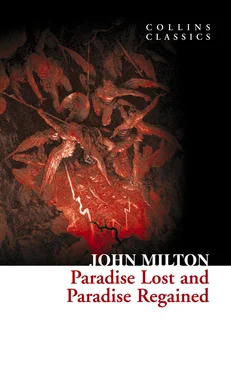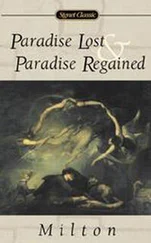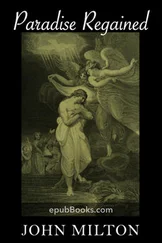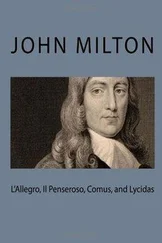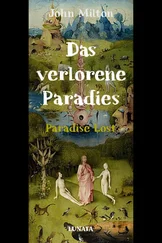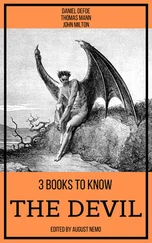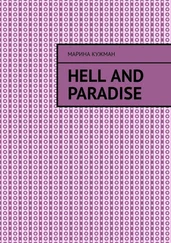And Accaron and Gaza’s frontier bounds.
Him followed Rimmon, whose delightful seat
Was fair Damascus, on the fertile banks
Of Abbana and Pharphar, lucid streams.
He also against the house of God was bold:
A leper once he lost, and gained a king—
Ahaz, his sottish conqueror, whom he drew
God’s altar to disparage and displace
For one of Syrian mode, whereon to burn
His odious offerings, and adore the gods
Whom he had vanquished. After these appeared
A crew who, under names of old renown—
Osiris, Isis, Orus, and their train—
With monstrous shapes and sorceries abused
Fanatic Egypt and her priests to seek
Their wandering gods disguised in brutish forms
Rather than human. Nor did Israel scape
Th’ infection, when their borrowed gold composed
The calf in Oreb; and the rebel king
Doubled that sin in Bethel and in Dan,
Likening his Maker to the grazed ox—
Jehovah, who, in one night, when he passed
From Egypt marching, equalled with one stroke
Both her first-born and all her bleating gods.
Belial came last; than whom a Spirit more lewd
Fell not from Heaven, or more gross to love
Vice for itself. To him no temple stood
Or altar smoked; yet who more oft than he
In temples and at altars, when the priest
Turns atheist, as did Eli’s sons, who filled
With lust and violence the house of God?
In courts and palaces he also reigns,
And in luxurious cities, where the noise
Of riot ascends above their loftiest towers,
And injury and outrage; and, when night
Darkens the streets, then wander forth the sons
Of Belial, flown with insolence and wine.
Witness the streets of Sodom, and that night
In Gibeah, when the hospitable door
Exposed a matron, to avoid worse rape.
These were the prime in order and in might:
The rest were long to tell; though far renowned
Th’ Ionian gods—of Javan’s issue held
Gods, yet confessed later than Heaven and Earth,
Their boasted parents;—Titan, Heaven’s first-born,
With his enormous brood, and birthright seized
By younger Saturn: he from mightier Jove,
His own and Rhea’s son, like measure found;
So Jove usurping reigned. These, first in Crete
And Ida known, thence on the snowy top
Of cold Olympus ruled the middle air,
Their highest heaven; or on the Delphian cliff,
Or in Dodona, and through all the bounds
Of Doric land; or who with Saturn old
Fled over Adria to th’ Hesperian fields,
And o’er the Celtic roamed the utmost Isles.
All these and more came flocking; but with looks
Downcast and damp; yet such wherein appeared
Obscure some glimpse of joy to have found their Chief
Not in despair, to have found themselves not lost
In loss itself; which on his countenance cast
Like doubtful hue. But he, his wonted pride
Soon recollecting, with high words, that bore
Semblance of worth, not substance, gently raised
Their fainting courage, and dispelled their fears.
Then straight commands that, at the warlike sound
Of trumpets loud and clarions, be upreared
His mighty standard. That proud honour claimed
Azazel as his right, a Cherub tall:
Who forthwith from the glittering staff unfurled
Th’ imperial ensign; which, full high advanced,
Shone like a meteor streaming to the wind,
With gems and golden lustre rich emblazed,
Seraphic arms and trophies; all the while
Sonorous metal blowing martial sounds:
At which the universal host up-sent
A shout that tore Hell’s concave, and beyond
Frighted the reign of Chaos and old Night.
All in a moment through the gloom were seen
Ten thousand banners rise into the air,
With orient colours waving: with them rose
A forest huge of spears; and thronging helms
Appeared, and serried shields in thick array
Of depth immeasurable. Anon they move
In perfect phalanx to the Dorian mood
Of flutes and soft recorders—such as raised
To height of noblest temper heroes old
Arming to battle, and instead of rage
Deliberate valour breathed, firm, and unmoved
With dread of death to flight or foul retreat;
Nor wanting power to mitigate and swage
With solemn touches troubled thoughts, and chase
Anguish and doubt and fear and sorrow and pain
From mortal or immortal minds. Thus they,
Breathing united force with fixed thought,
Moved on in silence to soft pipes that charmed
Their painful steps o’er the burnt soil. And now
Advanced in view they stand—a horrid front
Of dreadful length and dazzling arms, in guise
Of warriors old, with ordered spear and shield,
Awaiting what command their mighty Chief
Had to impose. He through the armed files
Darts his experienced eye, and soon traverse
The whole battalion views—their order due,
Their visages and stature as of gods;
Their number last he sums. And now his heart
Distends with pride, and, hardening in his strength,
Glories: for never, since created Man,
Met such embodied force as, named with these,
Could merit more than that small infantry
Warred on by cranes—though all the giant brood
Of Phlegra with th’ heroic race were joined
That fought at Thebes and Ilium, on each side
Mixed with auxiliar gods; and what resounds
In fable or romance of Uther’s son,
Begirt with British and Armoric knights;
And all who since, baptized or infidel,
Jousted in Aspramont, or Montalban,
Damasco, or Marocco, or Trebisond,
Or whom Biserta sent from Afric shore
When Charlemain with all his peerage fell
By Fontarabbia. Thus far these beyond
Compare of mortal prowess, yet observed
Their dread Commander. He, above the rest
In shape and gesture proudly eminent,
Stood like a tower. His form had yet not lost
All her original brightness, nor appeared
Less than Archangel ruined, and th’ excess
Of glory obscured: as when the sun new-risen
Looks through the horizontal misty air
Shorn of his beams, or, from behind the moon,
In dim eclipse, disastrous twilight sheds
On half the nations, and with fear of change
Perplexes monarchs. Darkened so, yet shone
Above them all th’ Archangel: but his face
Deep scars of thunder had intrenched, and care
Sat on his faded cheek, but under brows
Of dauntless courage, and considerate pride
Waiting revenge. Cruel his eye, but cast
Signs of remorse and passion, to behold
The fellows of his crime, the followers rather
(Far other once beheld in bliss), condemned
For ever now to have their lot in pain—
Millions of Spirits for his fault amerced
Of Heaven, and from eternal splendours flung
For his revolt—yet faithful how they stood,
Their glory withered; as, when heaven’s fire
Hath scathed the forest oaks or mountain pines,
With singed top their stately growth, though bare,
Stands on the blasted heath. He now prepared
To speak; whereat their doubled ranks they bend
From wing to wing, and half enclose him round
With all his peers: attention held them mute.
Thrice he assayed, and thrice, in spite of scorn,
Tears, such as Angels weep, burst forth: at last
Words interwove with sighs found out their way:—
“O myriads of immortal Spirits! O Powers
Matchless, but with th’ Almighty!—and that strife
Was not inglorious, though th’ event was dire,
As this place testifies, and this dire change,
Hateful to utter. But what power of mind,
Читать дальше
